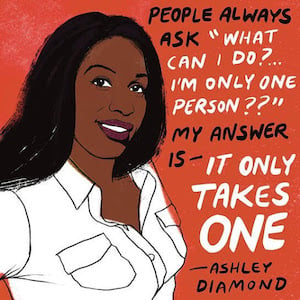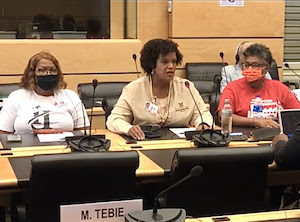Judge rules U.S. border turnback policy illegal—government must end practiceA district court judge ruled in Al Otro Lado v. Mayorkas that the government’s turnback policy — its practice of systematically rejecting asylum seekers at ports of entry along the U.S.-Mexico border — is illegal. The court concluded that under U.S. law, border agents are obligated to inspect and process individuals arriving at ports of entry and provide them with a fair and meaningful opportunity to seek asylum. In the wake of this ruling, Al Otro Lado, the Center for Gender & Refugee Studies, the American Immigration Council, the Center for Constitutional Rights, and the Southern Poverty Law Center call upon the Biden administration to heed the court’s ruling, end the turnback policy, and work toward restoring a fair, humane, and orderly asylum process at the southern border. “The court's decision rightly recognizes that the government's longstanding practice of turning back asylum seekers at ports of entry is illegal,” the Al Otro Lado litigation team said. “We hope the ruling will push the federal government to adopt policies at ports that place it on the right side of history, welcoming those seeking refuge in accordance with the procedures required by law. We are disappointed, however, by the court’s conclusion that the Supreme Court ruling in Garland v. Aleman Gonzalez limits its ability to redress the profound suffering that people seeking asylum will continue to endure. Since its inception, the turnback policy has stranded thousands of vulnerable families, children, and adults in precarious conditions, where they have faced kidnapping, assault, disappearance, and death. The lack of injunctive relief for due process violations resulting from ‘rapacious executive overreach,’ to use the court’s language, is incredibly frustrating.” Read more on our website. | ||
 Ashley Diamond, home at lastAshley Diamond, a Black transgender woman who has twice sued the Georgia Department of Corrections (GDC) for refusing to protect her from sexual assault or provide her with adequate medical care, was finally released from prison last week. Ms. Diamond, plaintiff in the case Diamond v. Ward, et al., will serve the remainder of her sentence on parole. “Although I’m elated to be released, I’m still damaged by what happened to me in prison and I’m worried about the people I left behind,” said Ms. Diamond. “I appreciate everyone who has helped and supported me. In many ways, the real challenges begin now.” Ms. Diamond, 44, like many Black transgender people in the South, experienced decades of discrimination prior to her incarceration. She received a harsh 12-year sentence in 2012 after pawning a saw that turned out to be stolen at the request of her then boyfriend. While she is still subject to that sentence, the parole board’s decision allows her to escape the horror of being a woman in a men’s prison. Recently Ms. Diamond was honored with the Excellence in Opinion/Editorial Writing Award from The Association of LGBTQ Journalists for her powerful op-ed in Them magazine, titled I’m a Trans Woman Locked in a Men’s Prison. I’m Fighting to Be Free. Learn more about Ashley Diamond’s case, and how to support her, by visiting our website.
| ||
 Black elders and community leaders from Louisiana testify on systemic racism to U.N. in Geneva & meet with UNESCO on protection of burial groundsLast week, we went to the United Nations with a delegation of Black elders and community leaders from Louisiana to engage the international community on their key human rights concerns. Before the UN Committee on the Elimination of Racial Discrimination (CERD), UN Independent Experts and country missions in Geneva, the Descendants Project, Inclusive Louisiana, and Concerned Citizens of St. John Parish detailed their longstanding efforts to protect the health and heritage of Black communities from environmental racism. We began our international advocacy efforts with representatives from the Routes of Enslaved Peoples Project at UNESCO in Paris, where community members shared local efforts to protect the burial grounds of enslaved people in Louisiana and invited those leading UNESCO’s project to visit their communities as part of their commitment to preserve the cultural heritage of people of African descent worldwide. We next traveled to Geneva, where these elders and community members addressed the CERD committee prior to the committee’s formal review of U.S. compliance with the CERD convention (August 11–12). Our partners transfixed the committee with their powerful testimony about the years of anger and frustration at the complete failure of local, state, and federal government to protect their historic Black communities from the many harms of toxic industry, including destruction and profound disregard for the burial grounds of their ancestors. To learn more about the delegation and demands made to the international community, visit our website. While you’re there, please read our joint-shadow report to the UN CERD Committee: The Afterlife of Black Enslavement: Environmental Racism and the Desecration of Black History in Louisiana. The delegation was also covered by many outlets, including L’Observateur and Liberatión. | ||
Activists resist Elon Musk’s SpaceX “colonization” of South Texas, citing environmental harm and gentrificationLast week, local activists submitted multiple requests for information on possible collusion between government officials and Elon Musk’s tech giant SpaceX in the company’s expansion in South Texas and the arrest of an environmental activist. The Freedom of Information Act (FOIA) requests are part of community groups’ ongoing opposition to the environmental harm and gentrification caused by the company’s expansion in Cameron County, one of the state’s poorest regions. Since it began operating in 2019, SpaceX has triggered numerous fires and explosions that have scattered pieces of metal so large they must be removed by machines. The earth-shaking noise, industrial fires, and boulder-sized debris threaten the area’s ecosystem. SpaceX sits on a sprawling compound located on land sacred to the Carrizo/Comecrudo Tribe, and Musk, who fancies himself the founder of a city by the South Texas launch site he calls Starbase, has plans to expand further. In June, the Federal Aviation Administration (FAA) completed its environmental review of SpaceX’s proposed missions. Although the federal agency mandated 75 steps to mitigate harm, the FAA’s finding of “No Significant Impact” clears the way for continued takeoffs of the world’s tallest rocket and the potential for continued, cumulative harm. For more information and to read the FOIA requests, visit our website. | ||
Sexual Minorities Uganda (SMUG) shut down by Ugandan bureau for NGOs, LGBTQIA+ advocacy deemed “undesirable and un-registrable”On Wednesday, August 3, the National Bureau for Non-Governmental Organizations, the government body that regulates NGOs in Uganda, halted the operations of our partners Sexual Minorities Uganda (SMUG) for non-registration with the NGO Bureau. In 2012, Frank Mugisha and others applied to the Uganda Registration Services Bureau under Section 18 of the companies Act, 2012, for the reservation of the name of the proposed company. In a letter dated February 16 2016, the URSB rejected the application to reserve the name ‘Sexual Minorities Uganda’ on the grounds that the name was “undesirable and un-registrable that the proposed company to be incorporated to advocate for the rights and wellbeing of Lesbians, Gay, Bisexual, Transgender and Queer persons, which persons are engaged in activities labeled criminal acts under sec.145 of the Penal Code Act.” The decision was upheld by the High Court of Uganda. The refusal to legalize SMUG’s operations that seek to protect LGBTQIA+ people who continue to face major discrimination in Uganda, actively encouraged by political and religious leaders, was a clear indication that the government of Uganda and its agencies are adamant and treat Ugandan gender and sexual minorities as second-class citizens. This further compromises efforts to demand better health services and escalates the already volatile environment for the LGBTQIA+ community. To learn more about SMUG’s advocacy and their calls to action in light of this latest targeting by the Ugandan government, visit SMUG’s Twitter page. |
August 24, 2022

